Life is a Continuous Series of Games
Hi Everyone,
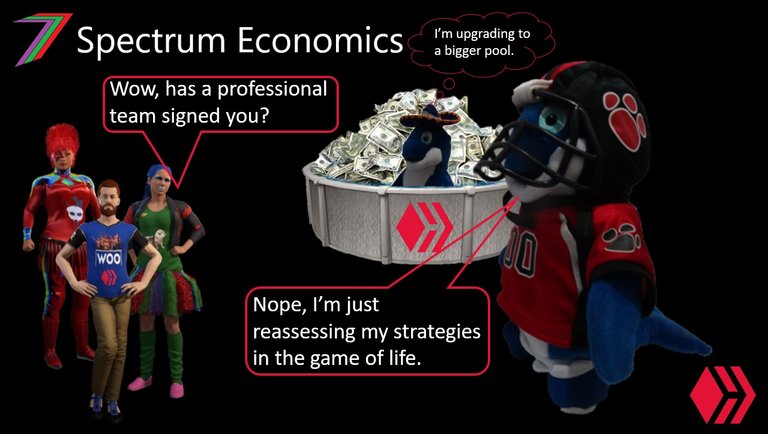
To analogize life with a game may seem like an oversimplification. Some might even consider it demeaning. I believe it to be the most pertinent comparison we can make. The two core elements of a game are competition and cooperation. Different teams compete with each other, and players on the same team cooperate with each other. All our interactions in this world can be described as competitive, cooperative, or both. The main difference between a game and life is that in life, we can determine our own parameters for success.
How do we fit in?
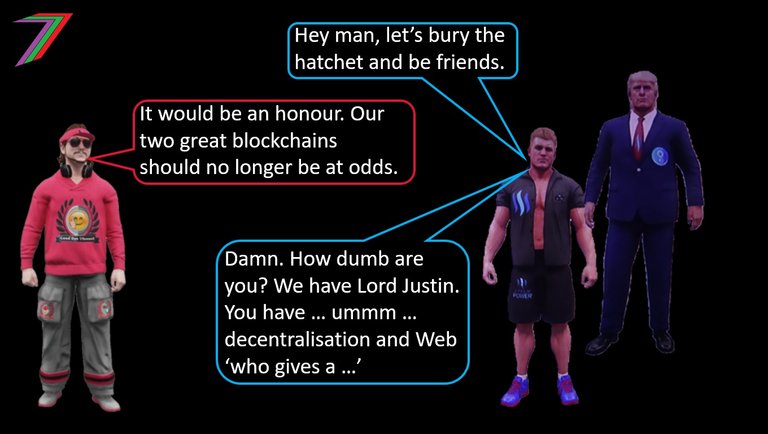
Life looks and feels incredibly complicated. There are billions of people in the world. There are billions of interactions and overlapping relationships. What is one person in this tapestry of our existence? Is he or she completely irrelevant, or an integral part of the overall design? In the absence of that person, how is the world different? Is it better, worse, or the same?
No matter who that person is, the answer is impossible to know; that even applies to prominent world figures. Everyone’s existence creates ripples. Almost everything we do has the potential to affect someone somewhere. This effect could amount to nothing significant, or it could change the lives of an innumerable number of people. In the absence of that person, there are no ripples. However, his or her absence may greatly affect the ripples created by other people.
Why do we exist? On a personal level, at least, to survive, but to ideally thrive. On a collective level, it is for the benefit of the family, the tribe, the community, the nation, and the species. Do our intentions align with ourselves, the collective, or both? We are self-aware. Hence, we are innately aware that our experiences and our actions are dependent on our existence. Therefore, we are naturally compelled to preserve our existence. On a more conscious level, we act to control our experiences. We rely on our perceptions to guide our actions.
Do we prioritise ourselves over others or the collective? We are bound by our perceptions. We might entirely focus on our own personal benefit. We might focus on ourselves, but also avoid what we perceive would negatively affect others. We might focus on what we perceive benefits others. Ultimately, whatever we focus on, offers us something in return; it could be direct gratification or a form of psychic income. Otherwise, our pursuit of these actions is not sustainable.
Our relationships with others can be complicated. However, we can simplify these relationships as being competitive, cooperative, or both. We sustain these relationships because we perceive or intrinsically feel they provide us with something in return. Our intentions towards others can vary significantly. We may genuinely seek to act in the best interest of others. On the other extreme, we may seek to destroy or manipulate others out of pure malice or even indifference. Our intentions are influenced by our perceptions. These perceptions could relate to ourselves, other people, current circumstances, desired outcomes, current feelings and emotions, or our belief system.
Games
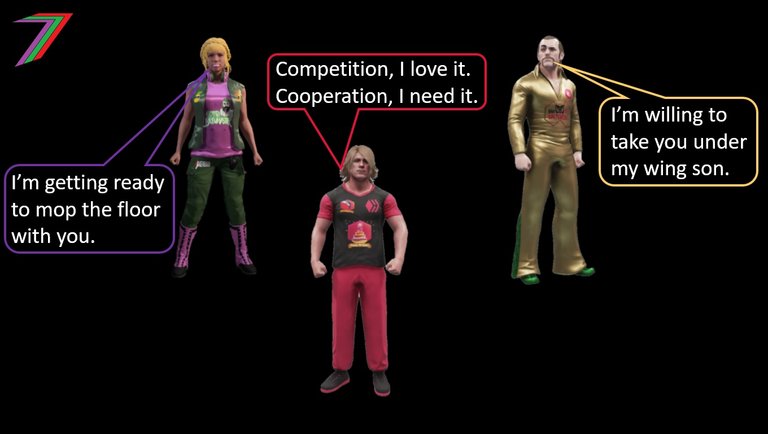
Our relationships can be beneficial to all, beneficial to some, beneficial to one, or beneficial to none. They can lead to a net improvement, a net decline, or no difference. Primarily competitive or cooperative relationships can lead to any of these outcomes. These outcomes can change over time.
Competition
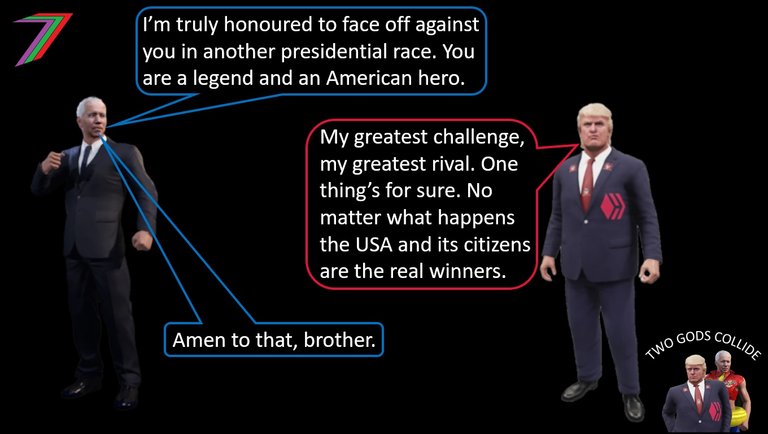
Competitive relationships can be constructive, destructive, or both in different timeframes. Competition leads to one person’s success over another’s. This could be a positive sum game; the winner gains more than what the loser loses. This could be a zero-sum game; the winner gains the equivalent of what the loser loses. This could be a negative sum game; the winner gains less than what the loser loses.
Most competition does not lead to zero-sum gains. If it does, it is often only in the short-run. This could be because different people have different expectations (i.e., asymmetric expectations) or because not all gains and losses are transferable.
Imagine two people play a game. The loser pays the winner $10. This may appear to be a zero-sum game. This is not necessarily the case. The loser may have lost $10 but could have gained valuable experience from the defeat. In the long-run, this gain in experience may exceed the $10 lost in this particular game. There may also be a flow-on effect for third parties and observers of the game.
Imagine a different game. This time it is a fight to the death; the winner remains alive, and the loser dies. If this game could be avoided, it appears to be a negative sum game. The winner gains from eliminating an opponent, but the loser loses far more, his or her life. However, the fight and the outcome of the fight could spill over to third parties. It is likely that at least one of the two fighting has a propensity for violence. If a violent person is killed, they will no longer be able to commit violence against others. It is also possible that this violent confrontation could encourage more of the same.
In our modern human world, competition rarely leads to death. Instead, it provides opportunities to learn and reflect. A person can learn why he or she lost. Then they can determine what measures can be taken to reduce the chances of losing again. A person may also realise that winning may be unattainable and decide to pursue a different path.
Cooperation
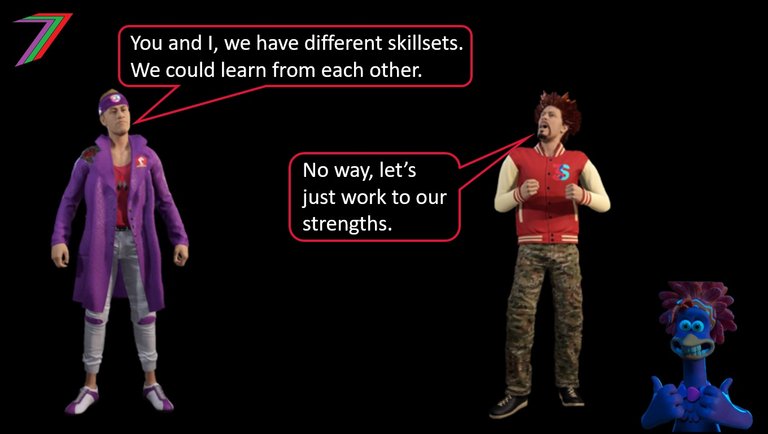
Cooperation does not necessarily produce winners or losers. It relates more to pursuing mutual benefits. There are many different ways of cooperating. It could involve the mutual sharing of information and knowledge. It could involve the sharing of tasks and workloads. It could involve offering support under certain circumstances.
Intuitively, cooperation appears to be positive sum game. However, this might not necessarily be the case, especially in the longer run. If cooperation leads to growth and increased capabilities for all involved, it will result in a positive sum game. If cooperation is focused on fixing an immediate need without the transfer of knowledge, it could create dependency and a possible erosion of skills in the longer run.
Imagine that two people are stranded on an island. The two people decide to cooperate by doing different tasks. One person builds and maintains the living area and structures, and the other person fishes for food. They both become specialised in their tasks, but they do not learn the tasks of the other person. They become highly dependent on each other. If something happens to one of them, the remaining one may not be able to survive by himself or herself.
If the two had cooperated in such a way that they both became more skilled at all tasks, each person could have become more self-sufficient when cooperation was no longer possible. This example highlights the flaws of specialisation in a limited and non-competitive environment.
Cooperation can be imbalanced. Some people contribute more than others do. This could be because they are willing to work harder, are more capable or talented, or have access to more resources. The higher contributors could be motivated by necessity, psychic income, bragging rights, status, or a desire for control over others. Some might regard their high contributions as temporary until others are able to contribute more. Some might regard their high contributions as permanent. Some might regard their high contributions as a signal of their authority, which they intend to maintain even if their contributions have fallen.
Some people who contribute less might not feel motivated to increase their contribution. While others will seek to become higher contributors.
Different people are motivated differently. Some people respond to intrinsic motivation. They are able to motivate themselves with their own personal desire to succeed by meeting their own goals. Some people require extrinsic motivation. They rely on external stimulus to succeed. Their motivation relies more heavily on the actions of others or other perceived external factors. For the latter, the actions of higher contributors will play a critical role in determining if the low contributors are motivated to contribute more. For the former, the actions of higher contributors, most likely, will have minimal impact. They would need to change how this group perceives themselves.
Competition vs. Cooperation
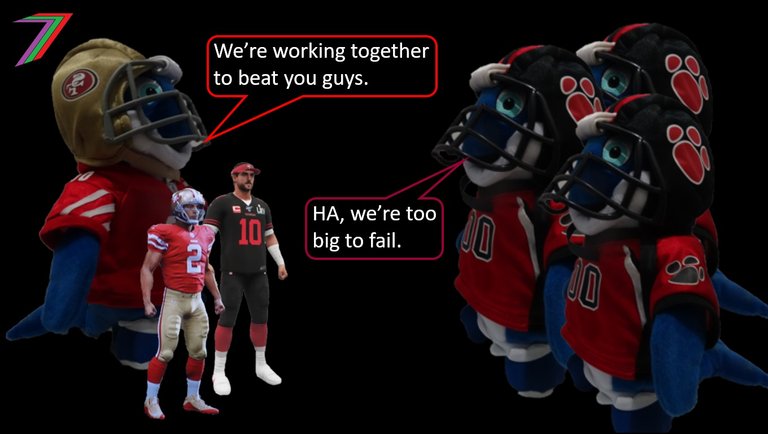
Competition and cooperation are always going to co-exist; the only question is to what extent. Success can be achieved with any mix of the two. It is how they are used that is most important. Competition could be used to sharpen people’s skills and refine their direction. Cooperation could be used to acquire knowledge or build mutually beneficial relationships.
The combined use of competition and cooperation can be incredibly effective and efficient. This is because they facilitate specialisation. Specialisation is possible because of cooperation. Cooperation enables people to focus on just a few tasks because other people can do the remaining tasks. However, specialisation is effective and efficient because of competition.
A group of people can more proficiently compete if some of its members have specialist skills. We can see this in almost all team sports. Cricket has bowlers and batsmen. Football has defenders, attackers, midfielders, and a goalkeeper. American football has over a dozen specialised positions. On a larger scale, this is true for businesses and countries. Competition also reduces dependency on others, as people can change teams or employers.
Specialisation is enhanced by diversity. Diversity of skills, ability, capability, physical traits, and ideas enables different people to excel in different things. In team sports, some positions are more suited to stronger, bigger athletes, and other positions are more suited to faster, smaller athletes. For businesses, some positions are suited to people with a creative flair and others to people who are more analytical. At the same time, specialisation encourages diversity. People are drawn to what they believe they can excel at.
Ironically, people who are specialised in particular roles may not appreciate diversity, even though they are a product of it. This is because they work closest to people who are similar to themselves. Hence, there is diversity on a macro level but not a micro level. This is most likely to occur in large organisations where interactions between diverse groups are more limited.
Management with non-specialist backgrounds might be required to bridge the gap between these groups. This would hinder the career progress of specialists and likely disincentivize them from pursuing a specialist role. Thus possibly reducing diversity. This problem would not exist in a more competitive environment, less dominated by large organisations.
Upcoming Posts
This post sets the stage for my new series, ‘The Playbook’. The series focuses on how life is played like a game. Everyone plays his or her game of life differently. A key area of discussion will be perceptions. It determines how we play and what we play for.
More posts

I have several collections of posts. I have organised these collections based on content and purpose.
The first collection contains six collection posts created before PeakD had the collection feature. Four of these posts relate to the core of my content; one of them contains all my Actifit Posts, and one of them contains my video course, ‘Economics is Everyone’.
The second collection consists of the posts that I consider define my channel. These posts are significant in terms of content as well as how they contribute to the growth of the channel. These posts reveal the most about what I believe in.
The third and fourth collections are what I call my ‘Freedom-based Economics Living Book’. They contain all the posts that support my ideas about the value and power of freedom. Some of these posts explain what we can achieve with freedom and what we need to utilise it for. Some of them explain how we are deprived of freedom and how we often give up freedom for security and comfort. The third collection concludes with possible scenarios depending on what we (society) choose to do.
Hive: Future of Social Media
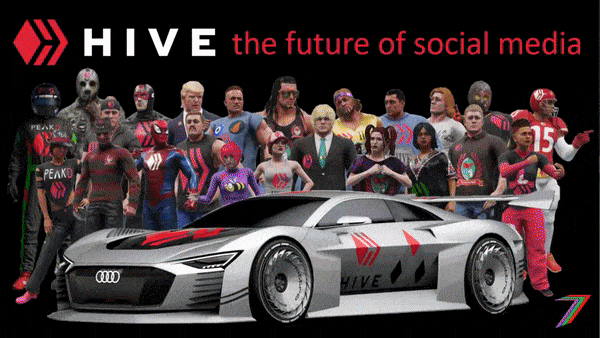
Spectrumecons on the Hive blockchain
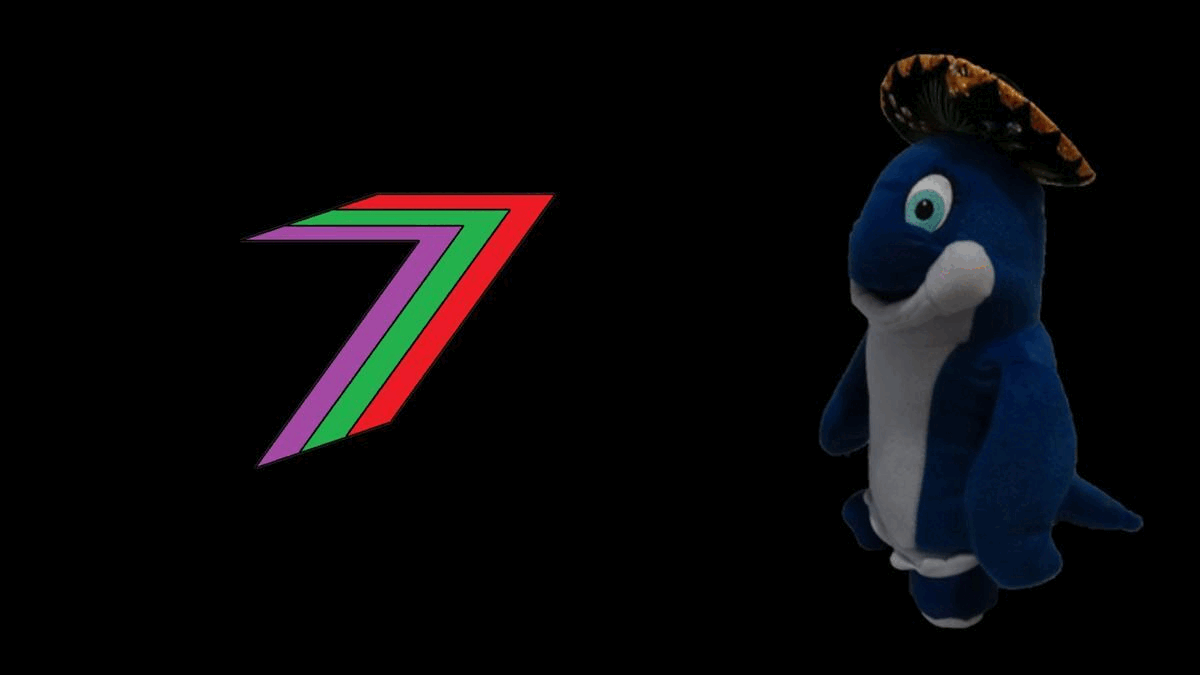




Looking at life like this makes it fun, and can help give a person goals. The schooling can be the tutorial/training phase of games. Choosing a job, can be choosing one's class in RPG. Getting promoted or switching jobs can be upgrading to a higher class or changing class. I also like how you discussed other aspects of it like the cooperation and competition.
If it makes life more entertaining, why not?
A big difference is your life plays out over a very long time. Most games don't last too long.
I agree with you that what happens in a game is akin to what happens in life. I understand that everyone wants to win, when one wins, the other looses and when one looses, the other wins. So life is a game of wins and losses.
You have quite a huge collection of work.
It's a lot more complicated than that. We all have different goals, objectives, and measurements for success. Games are rarely zero-sum. The impacts of games can be felt long into the future. A loss now could lead to future wins and success.
Amazing work
You've been curated by @plantpoweronhive! Delegations welcome!
Life really keep changing and changing as time goes on which is not actually supposed to be so. Sometimes life throw to us what we can't handle or what we plan not to be able to actually handle
Change is inevitable and necessary. However, not all change is good.
That's very true. Not all change is good. We must be very careful of the type of change we witnessed